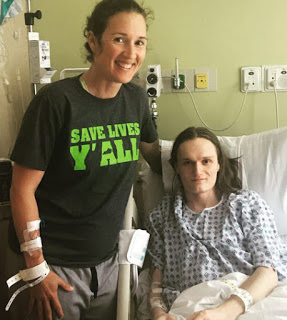Organ donor’s story spurs bill to give state employees paid time off for such donations, create tax deduction for related expenses

Beth Burbridge gave Jackson Alldaffer a kidney. (Courier Journal photo)
—–
“A woman who donated an organ to a complete stranger, then mounted a campaign to give paid leave to people who do likewise, told her story Thursday and moved a legislative committee that approved a bill giving the benefit to state employees,” Dalton Stokes reports for The State Journal in Frankfort.
“She could be denied health or life insurance because she’d had the surgery,” Loosemore reports. “Other states have laws in place that alleviate the risks or offer protection to live organ donors . . . but in Kentucky, there are none.”
“I was speechless,” she told the committee. “The surgery was not elective to the young man who was dying.” She had learned of his plight from a post on her neighborhood’s Facebook page.
“So, one Monday she had final testing at the hospital. Tuesday, she donated a kidney. Thursday, she returned home,” Stokes writes. “On Friday she needed to be off painkillers to make sure she could handle eight hours without medication, because she had to go back to work on Monday.”
She worked from home that day, but “anything complicated took me all day,” she told the committee, and she had to tell colleagues who asked her questions that they would have to wait for answers.
“Seeing the difficulties that face living organ donors,” Stokes reports, “she wrote Rep. Jerry Miller, R-Louisville, asking for help.
“Burbridge’s story began with a Facebook post,” Stokes writes. “One morning before she got to work, she saw a plea for help from the family of Jackson, a dying boy who lived in her Louisville neighborhood. He needed a kidney, but it couldn’t come from family because the disease was genetic. She saw she was a match for the blood type they needed and asked herself, ‘What if this was our family? . . . I kept thinking about my love for our sons; what would I do to save them?’
Miller got a similar bill passed on the third try in 2016, but then-Gov. Matt Bevin, on grounds that it created tax credits for employers. Miller said he scaled back the plan to tax deductions in light of the state’s fiscal difficulties.
Burbridge said she hopes the bill sets an example for other employers. Doctors told the committee that Kentucky had only 72 living organ donors last year, that 928 people in the state are waiting for organs who would be covered by the bill.